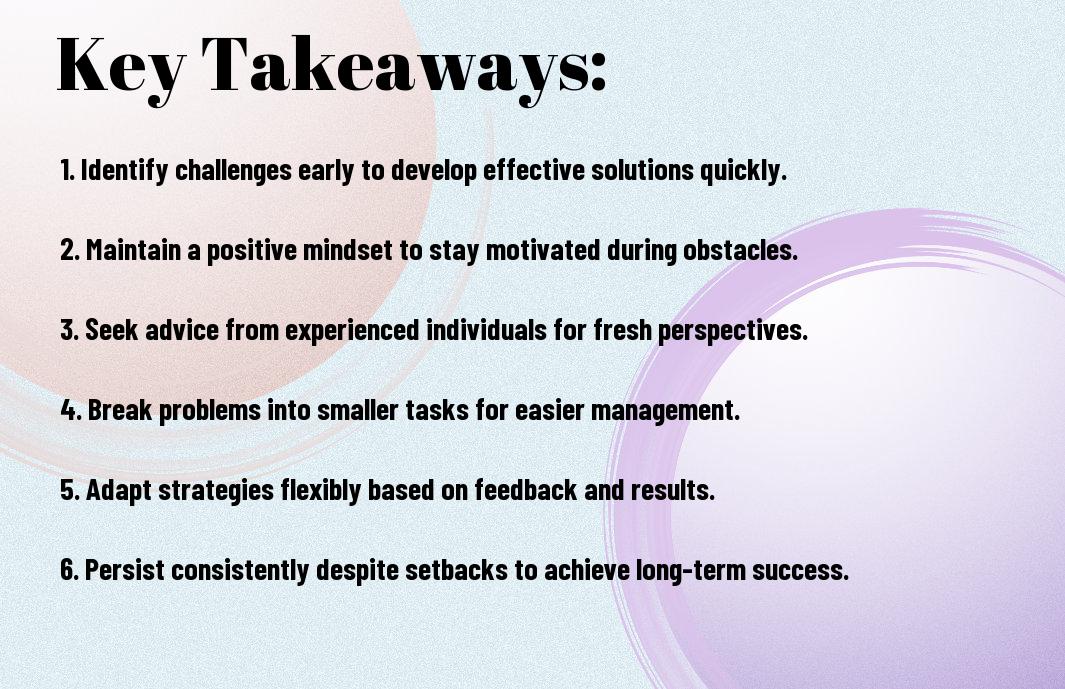Overcome obstacles that often stand in your way by understanding effective strategies tailored to your situation. You can tackle issues ranging from time management and motivation to communication and stress with practical approaches. By identifying these common challenges and applying proven solutions, you’ll build resilience and enhance your ability to succeed in both personal and professional areas. Empower yourself to face difficulties head-on and transform setbacks into opportunities for growth.
Key Takeaways:
- Identify and address obstacles early to prevent them from escalating into bigger problems.
- Develop adaptable strategies that can be customized to fit specific challenges and environments.
- Leverage available resources and seek support from others to enhance problem-solving efforts.


Recognizing the Roadblocks
Spotting challenges early can save you time and frustration. Resistance often creeps in unnoticed, whether from doubts within or pressures outside. Identifying these roadblocks helps you prepare strategies that address the exact hurdles rather than guessing at causes, giving you a clearer path forward and improving your chances of success.
Identifying Internal Resistance
Self-doubt, procrastination, and fear of failure are common internal barriers that sneak into your mindset, undermining progress. You might hesitate to take the first step, second-guess your decisions, or avoid risks that could propel you forward. Monitoring your thoughts and feelings can reveal patterns of hesitation or negativity that stall growth. Thou should tackle these mental blocks by fostering self-awareness and resilience through reflective practices or supportive coaching.
External Factors that Impede Progress
Unpredictable market shifts, unsupportive environments, or lack of resources often obstruct progress. For instance, a 2023 survey indicated 45% of startups fail due to inadequate funding, highlighting financial constraints as a major external factor. Additionally, organizational politics or regulatory hurdles can delay projects indefinitely. Thou can mitigate these by building flexible plans, expanding networks for support, and staying informed about industry changes.
Delving deeper into external obstacles shows you that environmental conditions vary widely. Economic downturns reduce customer spending and tighten budgets. Supply chain disruptions inflate costs and extend timelines. Social changes may affect consumer behavior, forcing pivots in strategy. Thou must remain adaptable, employing contingency plans, diversifying suppliers, and maintaining open communication channels to anticipate and react swiftly to such dynamics.
- Varied external challenges require customized responses rather than one-size-fits-all solutions.
- Networking can provide early warnings and collaborative problem-solving opportunities.
- Regularly updating your knowledge about industry trends prepares you for inevitable shifts.
- Thou should establish contingency budgets to absorb unexpected financial shocks.
Shifting Mindsets for Success
Making progress often means reexamining the beliefs that shape your approach to challenges. Adopting a mindset tuned to growth transforms obstacles into opportunities for learning and innovation. By actively adjusting how you perceive setbacks, you can unlock new pathways for achievement and maintain momentum even in the face of difficulty.
Embracing a Growth Mentality
You thrive by viewing skills and intelligence as qualities you develop through effort rather than fixed traits. This perspective encourages experimentation and persistence, allowing you to refine your abilities continuously. Studies reveal that individuals with a growth mindset tend to achieve higher academic and professional success because they seek feedback and stay motivated despite hurdles.
The Role of Resilience in Overcoming Adversity
Resilience equips you to bounce back from failure with renewed energy and adjusted strategies. Those who cultivate resilience often demonstrate greater emotional regulation and adaptability, important for navigating unpredictable situations. Research indicates resilient people face less stress and recover faster, enhancing both mental health and performance under pressure.
Diving deeper, resilience involves not only recovering from setbacks but also using those experiences to build stronger coping mechanisms. For example, entrepreneurs who encounter early business failures frequently analyze what went wrong and apply those lessons, increasing their odds of future success. Techniques like mindfulness, social support, and goal setting play pivotal roles in strengthening your resilience, enabling you to maintain clarity and confidence during challenging times.

Building a Supportive Environment
Creating a space where you feel empowered and motivated directly impacts your ability to overcome obstacles. Surrounding yourself with positive influences, clear expectations, and accessible encouragement fosters resilience. For example, setting up regular check-ins with mentors offers accountability, while arranging your workspace to minimize distractions enhances focus. These intentional choices establish a foundation that supports sustained progress.
Cultivating Relationships that Encourage Growth
You benefit greatly from relationships built on mutual respect and constructive feedback. Engage with individuals who challenge your thinking and celebrate your achievements equally. Cultivating these connections often involves seeking out peers or professionals who share your goals or values, enabling honest dialogue that propels development. A network like this not only offers guidance but also nurtures your confidence during setbacks.
Leveraging Community and Resources
Expanding your support beyond immediate contacts provides a wealth of tools and collective knowledge. Joining industry-specific groups, online forums, or local workshops connects you to diverse perspectives and practical advice. Tapping into these resources accelerates learning and problem-solving by exposing you to proven strategies and real-world experiences.
Communities such as professional associations or specialized online platforms often offer webinars, mentorship programs, and resource libraries that you can access at your convenience. For instance, platforms like LinkedIn Learning or specialized Slack channels provide curated content tailored to your skill level and interests. By actively participating in these communities, you gain insights that keep you updated on emerging trends and enable you to troubleshoot challenges more effectively. Harnessing these resources transforms solitary struggles into shared growth opportunities, enriching your journey with collective wisdom and support.

Practical Strategies for Breaking Through Barriers
Overcoming obstacles requires deliberate action and tailored strategies that align with your unique circumstances. Techniques such as breaking tasks into manageable chunks, leveraging technology to automate repetitive work, and seeking accountability partners can dramatically reduce resistance. Additionally, reframing setbacks as learning opportunities shifts your mindset from frustration to growth, making challenges feel less daunting and more like stepping stones on your journey.
Time Management Techniques for Increased Productivity
Applying methods like the Pomodoro Technique, where you work in focused intervals of 25 minutes followed by short breaks, can drastically improve concentration and stamina. Prioritizing tasks using the Eisenhower Matrix enables you to distinguish urgent from important duties, ensuring your efforts go where they matter most. Combining these approaches reduces overwhelm, helping you maintain steady progress without burnout.
The Importance of Setting Achievable Goals
Setting goals that are clear, specific, and attainable anchors your progress and sustains motivation. You benefit from measurable targets that allow tracking improvements and adjusting strategies promptly, preventing feelings of stagnation or discouragement. This structured approach propels you forward by transforming vague ambitions into actionable steps, aligning your efforts with realistic outcomes.
Diving deeper, achievable goals act as benchmarks that not only chart your course but also refine your focus. For instance, instead of a broad aim like “improve skills,” framing the target as “complete an advanced Excel course within two months” provides a concrete timeline and deliverable. This clarity helps prioritize daily actions, maintain momentum, and create a series of successes that build confidence. Furthermore, regular evaluation of these goals ensures flexibility, allowing you to recalibrate objectives in response to changing circumstances or new insights, keeping your progress dynamic and sustainable.
Learning from the Process
Tracking your progress reveals patterns that might otherwise go unnoticed. Analyzing what worked—and what didn’t—provides valuable insights for refining your approach. If a particular tactic consistently falls short, adjusting or replacing it stops repeated setbacks. This adaptive learning transforms each challenge into an opportunity to fine-tune your strategy, making future efforts more efficient and targeted toward your goals.
Reflecting on Failures for Future Success
Failures serve as data points that highlight weaknesses in your current methods. Writing down where things went wrong and why helps you avoid making the same mistakes again. For instance, if time management caused missed deadlines, dissecting those days can identify distractions or unrealistic expectations. Using these reflections as a blueprint, you create a smarter game plan that improves resilience and sharpens problem-solving skills for the next challenge.
Celebrating Small Wins to Maintain Motivation
Recognizing incremental progress keeps momentum alive when long-term goals seem distant. Breaking a large project into smaller tasks allows you to mark successes often, providing tangible proof of advancement. For example, finishing a key report section ahead of schedule can boost morale and generate positive energy that propels you into subsequent tasks with greater confidence and focus.
Building on small victories nurtures sustained motivation by reinforcing a sense of achievement. Acknowledging these moments, even with simple rewards or sharing accomplishments with peers, strengthens your commitment to the journey. Research shows that this practice can enhance productivity by up to 30%, as it creates positive feedback loops that make tackling challenges more enjoyable and less overwhelming.
To wrap up
From above, you can see that overcoming common challenges requires a proactive approach and a willingness to adapt. By identifying obstacles early, seeking solutions, and leveraging available resources, you empower yourself to navigate difficulties more effectively. Staying organized and maintaining a positive mindset will help you persist through setbacks, ensuring progress toward your goals. With consistent effort and strategic adjustments, you build resilience and confidence, enabling you to turn challenges into opportunities for growth and success.
FAQ
Q: What are some effective strategies to overcome procrastination when facing challenging tasks?
A: To overcome procrastination, break the task into smaller, manageable steps and set specific deadlines for each. Creating a structured schedule can help maintain focus, while minimizing distractions by turning off notifications or finding a quiet workspace can also improve productivity. Additionally, using techniques like the Pomodoro method, where you work in focused intervals followed by short breaks, can boost motivation and reduce overwhelm.
Q: How can I manage feelings of self-doubt when tackling difficult problems?
A: Managing self-doubt involves shifting your mindset toward positive self-talk and recognizing past successes. Reflect on previous challenges you’ve successfully navigated to build confidence. Seeking feedback or support from mentors, colleagues, or friends can provide encouragement and alternative perspectives. Practice mindfulness or relaxation techniques to reduce anxiety and maintain focus on the task rather than negative thoughts.
Q: What approaches can help improve problem-solving skills when facing common obstacles?
A: Enhancing problem-solving skills requires a combination of critical thinking and creativity. Start by clearly defining the problem and gathering all relevant information. Consider multiple solutions, weighing their pros and cons before deciding on the best approach. Engaging with others to brainstorm ideas can spark innovation. Regularly reflecting on what worked and what didn’t after solving a problem helps refine your skills for future challenges.


Leave a Reply